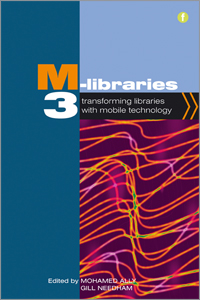
Primary tabs
You don't need to be an ALA Member to purchase from the ALA Store, but you'll be asked to create an online account/profile during checkout to proceed. This Web Account is for both Members and non-Members. Note that your ALA Member discount will be applied at the final step of the checkout process.
If you are Tax-Exempt, please verify that your account is currently set up as exempt before placing your order, as our new fulfillment center will need current documentation. Learn how to verify here.
- Description
- Table of Contents
- About the authors
- Reviews
A new generation of learners in an increasingly global information environment require libraries to play a greater role than ever in the delivery of education and training. Mobile technology offers huge potential to help libraries transform their service models to meet this challenge. A brand new edition of the highly successful M-Libraries series, this draws together cutting-edge international contributions from the leading authorities in the field. Based on the proceedings of the Third International M-Libraries Conference held in Brisbane in May 2011 it explores the variety of work that libraries are doing across the world to deliver resources to users, via a growing plethora of mobile and hand-held devices. The main strands of discussion include
- Mobile services and their development
- Mobile users, their behaviour and requirements
- Emerging technical developments including new platforms, devices and applications
- Strategy and infrastructure developments at national level
- Reflections and feedback on new service models
- Local innovation
This is an essential topical guide for information professionals in all sectors and also for policy makers, researchers, developers, publishers and suppliers. It will also be invaluable for students of library and information science and newcomers to the profession.
Foreword - Stephen AbramIntroduction - Gill Needham1. Education for all with mobile technology: the role of libraries - Mohamed Ally PART 1: DEVELOPING MOBILE SERVICES 2. Preparing for the mobile world: experimenting with changing technologies and applications for library services - Colin Bates and Rebecca Carruthers3. Enhancing open distance learning library services with mobile technologies - Jenny Raubenheimer4. Use of mobile phones in the delivery of consumer health information - Vahideh Zarea Gavgani5. Deploying an e-reader loan service at an online university - Anna Zuñiga-Ruiz and Cristina López-Pérez6. Mobile service providers and library services in a multi-campus library - Ela Volatabu Qica7. Using mobile technology to deliver information in audio format:learning by listening - Margie Wallin, Kate Kelly and Annika McGinley8. Sound selection: podcasts prove positive - Daniel McDonald and Roger Hawcroft PART 2: PEOPLE AND SKILLS 9. Staff preparedness to implement mobile technologies in libraries - Sarah-Jane Saravani and Gaby Haddow10. Apps and attitudes: towards an understanding of the m-librarian's professional make-up - Kate Davis and Helen Partridge11. There's a librarian in my pocket: mobile information literacy at UTS Library - Sophie McDonald12. Exploring student engagement with mobile technologies - Julie Cartwright, Sally Cummings, Bernadette Royal, Michelle Turner and JoAnne Witt13. It's just not the same: mobile information literacy - Andrew Walsh and Peter Godwin14. The students have iPods: an opportunity to use iPods as a teaching tool in the library - Iris Ambrose PART 3: FOCUS ON TECHNOLOGY 15. Mobile services of the National Library of China - Wei Dawei, Xie Qiang and Niu Xianyun16. India's mobile technology infrastructure to support m-services for education and libraries - Seema Chandhok and Parveen Babbar17. Use and user context of mobile computing: a rapid ethnographic study - Jim Hahn18. Meeting the needs of library users on the mobile web - Hassan Sheikh and Keren Mills19. Mobile dynamic display systems for library opening hours - Keiso Katsura20. Device-independent and user-tailored delivery of mobile library service content - Damien Meere, Ivan Ganchev, Máirtín Ó Droma,Mícheál Ó hAodha and Stanimir Stojanov21. Designing effective mobile web presence - Sam MoffattConclusion - Mohamed Ally
Mohamed Ally
Professor Mohamed Ally PhD is Professor in the Centre for Distance Education and Researcher in the Technology Enhanced Knowledge Research Institute (TEKRI) at Athabasca University in Canada. He obtained his PhD from the University of Alberta, Canada. He was Director of the Centre of Distance Education and Director of the School of Computing and Information Systems at Athabasca University. His current areas of research include mobile learning, e-learning, distance education, problem-based learning and use of emerging learning technologies in education and training. Dr. Ally is Past-President of the International Federation of Training and Development Organizations (IFTDO) and is one of the Founding Directors of the International Association of Mobile Learning (IamLearn). He recently edited seven books on the use of emerging technologies in education. Dr. Ally has presented keynote speeches, papers and workshops at many conferences.
Gill Needham
Gill Needham is currently Associate Director (Information Management and Innovation) at the Open University Library. Her varied career has encompassed roles as researcher, librarian, project manager and educator. She has more than 25 years' experience in senior roles in the library and information sector, with an emphasis on innovation and skills development. Since joining the Open University she has led strategic work in areas such as information literacy, flexible learner support and library systems development and has authored on a number of Open University courses. She was awarded a National Teaching Fellowship by the Higher Education Academy in 2006. Current work obsessions are digital literacy, mobile developments and digital libraries.
"...a topical guide for information professionals in all sectors. These include policy makers, researchers, developers, publishers and suppliers. Students of library and information science and newcomers to the profession will also find it an invaluable resource. The book reads easily; bibliographies appearing at the end of each chapter can prompt further reading, and a useful index concludes the book."
— Online Information Review
"...a seminal contribution...an essential, core contribution to Library Science reference collections."
— Midwest Book Review


